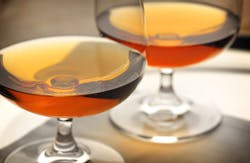Electronic ‘tongue’ tests quality of food, water, pharmaceuticals
Tasting is an essential stage in the process when producing a wide range of food and drink products. Manufacturers rely on the skills of expert tasters to assess the quality and uniformity of each batch.
Yet some might say this is a less than scientific approach to product quality. Could technology one day replace human taste testing in the production process?
Electronic "tongues" are already starting to be deployed by the food and beverage industry for a range of purposes, from authenticating Thai food to measuring beer quality, the American Chemical Society reports. But the devices developed so far are limited in how they can be used.
Researchers in Ukraine have developed an electronic tongue with a silicon surface that they say could be used to quality-check food and drinks and might also have applications in medical diagnostics, pharmaceutical testing and environmental monitoring. For instance, it could be used to monitor water for pollutants or to test blood for signs of disease.
In the journal ACS Applied Materials & Interfaces, S.V. Litvinenko and colleagues explain that the electronic tongue is an analytical instrument which mimics how we distinguish tastes. Just like taste buds sense and transmit flavor messages to the brain, the device incorporates tiny sensors which detect substances in a sample and send signals to a computer for processing.
They say that the low-cost and environmentally friendly "e-tongue" with a silicon base could be easily incorporated into existing electronic systems of the same material.
In tests with Armagnac, cognac, whiskey and water, the researchers were able to establish characteristic electronic fingerprints for each.
Their work could pave the way for the launch of a new tasting instrument with potentially diverse applications.
